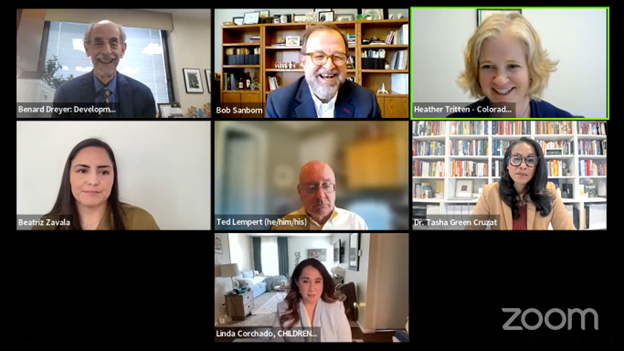
Press Conference: Changes at U.S. Department of Education Impact Support for Emergent Bilingual Students
Massive layoffs at the U.S. Department of Education are predicted to impact 1.27 million Texas children
Media Contacts:
Morgan Gerri, 832.600.9354
Rashena Franklin, 713.301.4577
TEXAS (March 19, 2025) – In an unprecedented move, the U.S. Department of Education has laid off 50% of its workforce. Currently, Texas receives the second highest amount of federal funding in the country, this includes supporting students with disabilities, students who are experiencing homelessness and provides grants to improve the effectiveness of teacher instruction. These cuts also include the complete dissolution of the Office of English Language Acquisition (OELA). This decision effectively eliminates crucial federal leadership, educator support, and resources designed to help emergent bilingual students succeed in school. Emergent bilingual and English Learners are one of the fastest-growing student populations in Texas, making up 20% (1,269,408 children) of the student population.
CHILDREN AT RISK (C@R) and fellow child advocates will hold a press conference on Wednesday, March 19th at 10:30 AM to address the devastating impact of the U.S. Department of Education’s recent mass layoffs, including the dissolution of the Office of English Language Acquisition (OELA). The removal of this critical federal office eliminates essential resources, educator support, and oversight designed to help Emergent Bilingual (EB) and English Learner (EL) students succeed in school. Without OELA’s leadership, millions of students will face greater challenges in accessing quality bilingual education, further deepening existing disparities.
“These cuts will have a disproportionate impact on our fastest growing student population here in Texas,” said Dr. Bob Sanborn, CEO of CHILDREN AT RISK. “Supporting our emergent bilingual student population is imperative, not only to the growth of our economy, but to ensure that all our Texas children are equipped with the necessary skills to succeed. We are keeping an eye on these developments with great concern.”
“Abolishing entire offices such as the Office of English Language Acquisition and other offices will leave grantees without technical support and monitoring of their grants,” said Montserrat Garibay, Former Assistant Deputy Secretary and Director, Office of English Language Acquisition, U.S. Department of Education. “They will be devastated by the uncertainty, and this will affect how they are serving our students. I am specifically concerned about our 5.3 million English learners, of which over 70% are U.S. citizens and are learning English in our schools. This is a blunt attack on our most vulnerable students.”
“Federal cuts to education will have a significant impact on immigrant students, who already face challenges in acclimating to a new school system, language, and culture, said Jida Nabulsi, Emgage, Texas State Director. School districts already depend on external resources to provide mentorship, coaching, and support—not only for these students but also for their families. Further reductions in funding put our New American students at even greater risk, jeopardizing their path to academic success and success in their new community.”
“The Department and the programs it oversees are integral to the efficacy of our state’s public education system. In Texas alone, the Department invests $13.9 billion in our students annually,” said Jonathan Feinstein, State Director for Texas at EdTrust. The Department is also the primary federal safeguard that protects students’ civil rights and ensures that all students, regardless of race, disability, income, and more, are provided access to a high-quality public education. Dismantling the Department risks returning us to an era where civil rights violations go unchallenged, students are left behind, and education becomes a privilege, not a right.”
These cuts not only threaten bilingual education but also put at risk billions in federal funding that supports public schools, students with disabilities, teacher training, and access to higher education. Texas alone stands to lose $1.88 billion in Title I funding, $1.35 billion in IDEA grants, and millions more for teacher development and career education programs. The ripple effects of these cuts extend far beyond EB/EL students, threatening the stability of public education nationwide. The loss of federal oversight and guidance will weaken support for students with disabilities, impact school districts’ ability to recruit and retain qualified educators, and hinder access to higher education for low-income students.
Key Data Highlights:
- EB/ELs are one of the fastest-growing student populations in Texas, making up 20% (1,269,408 children) of the student population.
- The EB/EL student population in Texas grew by 49% from 2013 to 2023.
- Bilingual-certified teachers are in critically short supply: Texas has a 1:16 bilingual teacher-to-student ratio, which is worse than the general teacher ratio of 1:15.
- Schools with high EB/EL student engagement often rely on OELA-supported initiatives, such as:
- Dual-language programs
- Teacher professional development
- Assistance administering and managing Title III projects
- About 89 percent of recent immigrant children in 2021 spoke a language other than English at home, compared to 81 percent of longer residing immigrants and 60 percent of U.S. born children with at least one immigrant parent.ii
- Graduation rates are lower: 89% for EB/EL students vs. 95% for non-EB/EL students.
- Chronic absenteeism for EB/ELs is 21%, slightly lower than non-EB/EL students (22%), suggesting they are engaged but still face structural disadvantages.
- Texas stands to lose approximately $1.88 billion affecting 3.68 million students in Title I grants (ESEA Title I, Part A), designed to provide academic support to help children meet state standards, especially in districts serving more children from low-income backgrounds.iii
- Texas could potentially lose $1.35 billion in Individuals with Disabilities Education Act (IDEA) Grants, impacting over 806,000 students .
- Texas risks losing $241 million, affecting approximately 376,000 educators, in Supporting Effective Instruction State Grants (ESEA Title II, Part A) that aim to improve the quality and effectiveness of teachers, principals, and other school leaders
- English Language Acquisition State Grants (ESEA Title III, Part A) provides grants to improve the education of English learners by helping them learn English and meet challenging state academic standards. The potential loss of $144 million could affect over 1.09 million English learners in Texas.
The dissolution of the Office of English Language Acquisition (OELA) poses a significant threat to the educational success of Emergent Bilingual (EB) and English Learner (EL) students nationwide. As a key federal entity, OELA provided essential educator training, funding guidance, and accountability measures to ensure that EB/EL students received the support necessary to thrive in the classroom. Without this leadership, school districts will struggle to implement effective bilingual education programs, exacerbating the existing shortage of qualified bilingual teachers and further weakening the teacher pipeline. The absence of targeted federal oversight leaves 20% of Texas students more vulnerable to systemic gaps, increasing their risk of falling behind academically, disengaging from school, and facing lower graduation rates. The elimination of OELA is not just a bureaucratic shift—it represents a direct attack on the educational equity of millions of students who depend on these resources to succeed.
FEATURING
Dr. Bob Sanborn – President and CEO, CHILDREN AT RISK (C@R)
Jonathan Feinstein, State Director for Texas ot EdTrust in Texas
Montserrat Garibay, Former Assistant Deputy Secretary and Director, Office of English Language Acquisition, U.S. Department of Education
Alejandra Vázquez Baur, Fellow, The Century Foundation
Jida Nabulsi, Emgage, Texas State Director
Linda Corchado – Senior Director, Children’s Immigration Network, (C@R)
READ MORE FROM C@R

July Newsletter | The Children’s Immigration Network
The Children's Immigration Network is CHILDREN AT RISK's effort to focus on children of immigrants. Our vision is for the state of Texas to offer a welcoming environment for immigrants and refugees where children of immigrants can integrate and access the resources...

Recap | National Immigration Summit: Leading with a Child-Centered Focus
This post was written by Sebastiao Goncalves, Communications Intern & Podcast Producer, and Becky Quintanilla, Project Coordinator with CHILDREN AT RISK. On Thursday, June 20th, CHILDREN AT RISK (C@R), the Texas Family Leadership Council (TXFLC), DiversifiED...

Advocates Convene in Support of New DACA & Parole in Place Executive Orders on Immigration
Advocates Convene in Support of Recent Executive Orders on Immigration Texas advocates applaud federal efforts to stabilize families and empower economic prosperity for undocumented spouses and Dreamers. Media Contact: Rashena Flagg, 713.301.4577 CHILDREN AT...
April Newsletter | The Children’s Immigration Network
Our vision is for the state of Texas to offer a welcoming environment for immigrants and refugees where immigrant children can integrate and access the resources they need to learn, grow and thrive. While the diversity of our immigrant community enriches our state, it...

National organizations gather to advocate for the protection of vulnerable immigrant children in the U.S.
Media Contact: Rashena Flagg, 713.301.4577 Two years since Texas leadership announced the state would transport migrants who had been released from federal custody to other states, Texas has transported over 102,000 migrants to New York, Chicago, Denver, Philadelphia,...
2024 C@R Special Events
Special Eventsconvening for change Every dollar donated helps us improve the lives of Texas children. CHILDREN AT RISK is a 501(c)(3) non-profit organization (EIN: 76-0360533). Contributions are tax-deductible to the fullest extent allowed by law. It is with immense...